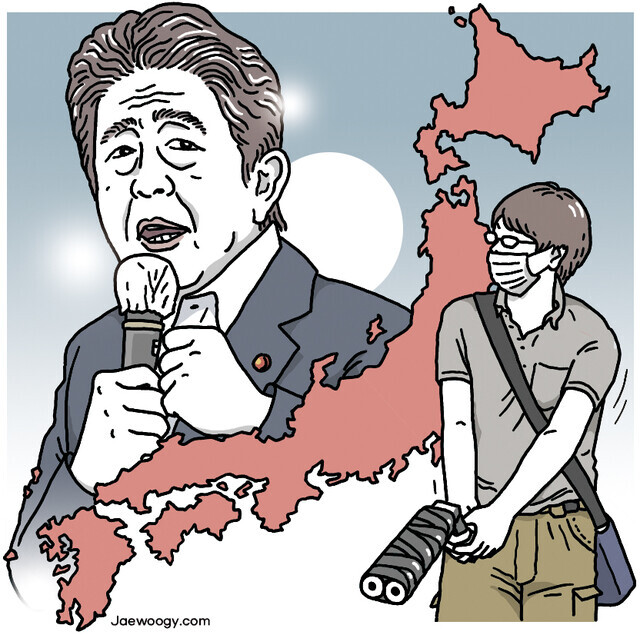hankyoreh
Links to other country sites 다른 나라 사이트 링크
[Column] The death of Abe and the assassination of Japan’s PM 90 years ago

The assassination of Japanese Prime Minister Tsuyoshi Inukai at his home by young right-wing officers on May 15, 1932, was a turning point in history.
Inukai’s killing was linked to Manchukuo, the puppet state set up in Manchuria, in Northeast China, by Japan’s Kwantung Army.
The Japanese military and the political right wing argued that Manchuria was a “lifeline,” just as they’d earlier said about Korea. Acquiring Manchuria’s “special interests” was the only way for Japan to protect its national security as a latecomer to imperial power, they asserted.
On Sept. 18, 1931, the Japanese army staged a bombing of a railroad near Mukden (today known as Shenyang), in China’s Liaoning Province, and blamed it on the Chinese military. Within six months, the Kwantung Army had gained control of most of Manchuria.
In response to an appeal from China, the League of Nations sent a commission to Manchuria to investigate the incident, which inflamed propagandistic claims inside Japan that their nation was facing an unfair attack.
At the time, Japanese prime ministers, who were civilians, were concerned that the military was driving Japan into war, but had no power to control it.
Tsuyoshi Inukai, who became prime minister at the end of 1931, tried to postpone the official declaration of Manchukuo as an independent state, but this was in vain. When the Japanese navy attacked Chinese forces in Shanghai, Inukai pleaded with the emperor to intervene, but this too was to no avail.
When right-wing officers broke into his official residence, Inukai tried to plead with them through dialogue, but was shot dead. With the prime minister assassinated, the party-based Cabinet collapsed, and Japan saw the advent of an era of rule by military-tied prime ministers.
Meanwhile, anxiety spurred by the Great Depression swept the world, causing the middle class to collapse and peasants to fall into extreme poverty. The foundation of democracy had disappeared. Around the same time, the Nazis came to power in Germany in 1933, and fascism and militarism became the new normal.
In the early morning of Feb. 26, 1936, a coup was launched by 1,400 low-ranking officers belonging to the Imperial Way Faction, or Kodoha, who insisted on eradicating vested interests and establishing a fundamentalist system based around the emperor.
During the coup, Minister of the Interior Makoto Saito, a former prime minister himself, and others were murdered but Prime Minister Keisuke Okada survived. The following year, 1937, Japan entered the Sino-Japanese War.
However, even after the war was over, political assassinations remained a running thread in Japan’s modern history.
In 1960, Inejiro Asanuma, the leader of Japan’s Socialist Party, was stabbed to death by a right-wing youth during a speech, and in 2007, Nagasaki Mayor Iccho Itoh, who was critical of the Liberal Democratic Party’s nuclear weapons policy and moves to reform the country’s pacifist constitution , was shot and killed by a member of the yakuza.
The assassination of former Prime Minister Shinzo Abe on Friday, July 8, was the first assassination of a former or incumbent prime minister in Japan after World War II.
Given Abe’s status as a symbol of right-wing politics in Japan, his death carries a different significance from previous cases when politicians were killed by the far-right due to opposing beliefs.
Nevertheless, the world is gripped by angst as though we have backtracked a hundred years.
Russia's invasion of Ukraine is taking place on the basis of a "lifeline" logic similar to that of the Japanese Kwantung Army's invasion of Manchuria in the 1930s.
The world is again engulfed in a crisis of democracy and economic instability. Japanese society mourning the tragic death of former Prime Minister Abe is again at a crossroads. I hope that while reflecting on the lessons of history, we will find a better way rather than revising the pacifist constitution or opting for rearmament.
By Park Min-hee, editorial writer
Please direct questions or comments to [english@hani.co.kr]

Editorial・opinion
![[Column] Season 2 of special prosecutor probe may be coming to Korea soon [Column] Season 2 of special prosecutor probe may be coming to Korea soon](https://flexible.img.hani.co.kr/flexible/normal/500/300/imgdb/original/2024/0426/3317141030699447.jpg) [Column] Season 2 of special prosecutor probe may be coming to Korea soon
[Column] Season 2 of special prosecutor probe may be coming to Korea soon![[Column] Park Geun-hye déjà vu in Yoon Suk-yeol [Column] Park Geun-hye déjà vu in Yoon Suk-yeol](https://flexible.img.hani.co.kr/flexible/normal/500/300/imgdb/original/2024/0424/651713945113788.jpg) [Column] Park Geun-hye déjà vu in Yoon Suk-yeol
[Column] Park Geun-hye déjà vu in Yoon Suk-yeol- [Editorial] New weight of N. Korea’s nuclear threats makes dialogue all the more urgent
- [Guest essay] The real reason Korea’s new right wants to dub Rhee a founding father
- [Column] ‘Choson’: Is it time we start referring to N. Korea in its own terms?
- [Editorial] Japan’s rewriting of history with Korea has gone too far
- [Column] The president’s questionable capacity for dialogue
- [Column] Are chaebol firms just pizza pies for families to divvy up as they please?
- [Column] Has Korea, too, crossed the Rubicon on China?
- [Correspondent’s column] In Japan’s alliance with US, echoes of its past alliances with UK
Most viewed articles
- 11 in 5 unwed Korean women want child-free life, study shows
- 2‘We must say no’: Seoul defense chief on Korean, USFK involvement in hypothetical Taiwan crisis
- 3AI is catching up with humans at a ‘shocking’ rate
- 4[Column] Can we finally put to bed the theory that Sewol ferry crashed into a submarine?
- 5[Editorial] Yoon cries wolf of political attacks amid criticism over Tokyo summit
- 6The dream K-drama boyfriend stealing hearts and screens in Japan
- 7[Photo] “Comfort woman” survivor calls on president to fulfill promises
- 8[Editorial] Was justice served in acquittal of Samsung’s Lee Jae-yong?
- 9[Column] Has Korea, too, crossed the Rubicon on China?
- 10Doubts remain over whether Yoon will get his money out of trip to Japan